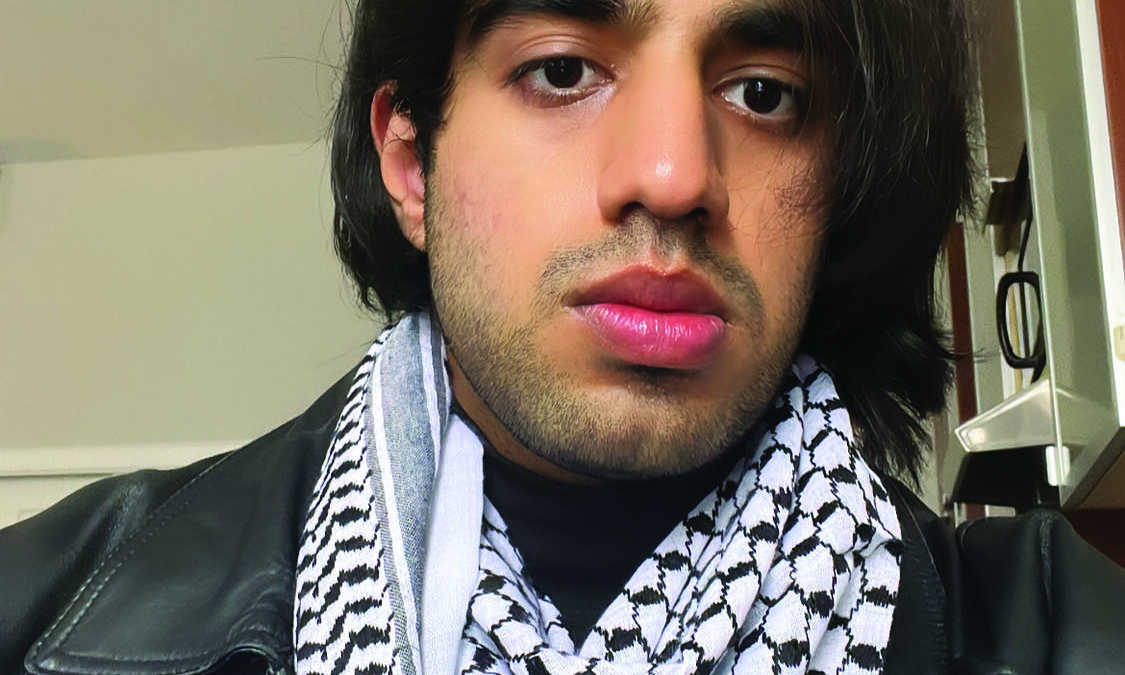Ali Imran, Staff Writer–
If you are Palestinian on a college campus, there is no knowing to what extremes you will be persecuted. You can be shot, threatened, harassed, doxxed, fired, suspended, and denied access to housing and medical services.
Last week, Columbia, Vanderbilt, Pomona, and other colleges suspended and arrested students for protesting their universities’ financial and political investments in the Israeli genocide in Gaza as an act of complicity in genocide. An entire contingent of militarized police in riot gear descended upon students at Pomona while students at various colleges found themselves houseless as access to their dorms was revoked without due process. While these measures specifically target Palestinians, their allies are not spared either.
Importantly, these colleges have also targeted Jewish students and faculty while instrumentalizing their identities for repressive measures. Many will remember the 20 smiling faces of anti-Zionist Jewish students being arrested and paraded at Brown University as an indictment of the immoral instrumentalization of antisemitism to target anti-Zionist Jewish students as well.
But this repression has not been limited to students and it is not recent either. It is impossible to talk about repression without keeping in mind why students and faculty are revolting alongside those on the streets. They are protesting the Israeli genocide that has literally destroyed every single university in Gaza and killed hundreds of scholars and students.
Under colonial occupation and apartheid, the right to education for Palestinians is always compromised and non-existent in many cases. Similarly, within Israel, Palestinians live under an apartheid regime of exclusion and discrimination. Just recently, Dr. Nadera Shalhoub-Kevorkian was suspended for bringing “shame” to the Hebrew University of Jerusalem by “cynically deploying academic freedom and freedom of speech.”
The Palestinian diaspora has been at the receiving end of state-sponsored repression for decades. Generations of Palestinian scholars like Rabab Abdulhadi, Steven Salaita, Noura Erakat, Mohammed El-Kurd and numerous others have been fighting the worst of repression and Zionist violence in the US. The late Edward Said faced personal attacks, death threats, and even firebombing. The curated blacklist of Palestinians in academia, the Canary Mission, created and used by Zionists for harassment and discrimination has been around for years. There are hate-groups, supported by organizations like ADL and AIPAC, for the express purpose of lawfare and slander against Palestinians and Palestinian advocacy in higher education.
It is unsurprising then that shocking numbers of professors in the US have been fired from their jobs since Oct. 7, 2023, for supporting Palestinian liberation and in most cases for merely trying to hold dialogue. Of course, this targeting affects non-tenured, visiting, women, and BIPOC faculty the most. Ironically, in my experience, they are overrepresented in organizing circles compared to their privileged (white, male, tenured) colleagues.
Earlier this year, the Director of Women’s, Gender, and Sexuality Studies at Florida Atlantic University (FAU), Nicole Erin Morse, resigned as she was forced by the institution to choose “between taking a leave of absence or disaffiliating from my anti-Zionist [Jewish] congregation.” Last week Vanderbilt University got journalist Eli Motyka handcuffed and arrested for covering student protests in response to the university blocking the Vanderbilt Student Government from holding a referendum on divesting from genocide.
Literary figures like Adania Shibli, Masha Ghesen, and Viet Thanh Nguyen have all been deplatformed and disinvited from literary and scholarly events as well. So actually, free speech is more a liberal fantasy operationalized mainly to serve the interests of the powerful.
While a survey of what is happening at Denison is beyond the scope of this article, these very dynamics are very much alive here. Students for Justice in Palestine (SJP) and faculty have consistently challenged and complained about repression to no avail (we should file grievances with the Department of Education’s Office for Civil Rights now). But let’s just look at some aspects: one professor complained that Denison students chanting “From the River to the Sea, Palestine will be Free” equates with “Judenfrei”. Another professor complained to a class that Jews for Free Palestine is like women who don’t think women should work and that there are always people working against their “own interests.” An administrator lied to student activists and then told them that they were providing ideological support for terrorism (while a dozen white faculty heroes labeled faculty and students as “jihadist terrorist” supporters), another administrator forced them to take down the Palestinian flag in a space they had booked, and I can just go on forever.
It is amusing that most of these individuals have never attended SJP events, been able to back or justify their accusations or actions, or acknowledged the clear stances of students and scholars (including Jewish students and faculty) who have been organizing with or supporting SJP. All of this has a few implicit goals and intentions: a reassertion of racist structures against Palestinians and Palestinian liberation organizing, essentializing Palestinians and criminalizing their rights and struggle for liberation, isolating Palestinians and manipulating limited time and resources available in grass-roots organizing, conflating Jewish tradition and identity with Zionism in service of colonialism, occupation, and genocide, and, more generally, producing docile subjects that will not and cannot revolt against neoliberal institutions and systems of exploitation.
Ali Imran ‘24 is a Women’s and Gender Studies and Anthropology and Sociology major from Lahore, Pakistan.

